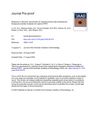 1 citations,
August 2023 in “International Journal of Molecular Sciences”
1 citations,
August 2023 in “International Journal of Molecular Sciences” Platelet Rich Plasma-Derived Extracellular Vesicles show promise for healing and regeneration but need standardized methods for consistent results.
 1 citations,
August 2023 in “Bioengineering”
1 citations,
August 2023 in “Bioengineering” PRP may help with aging and osteoarthritis, improving tissue repair and reducing surgery risk.
 1 citations,
July 2023 in “Aesthetic Plastic Surgery”
1 citations,
July 2023 in “Aesthetic Plastic Surgery” PRP treatment for hair loss might improve how patients feel about their quality of life, but more research is needed to confirm its effectiveness.
 1 citations,
March 2023 in “International Journal of Trichology”
1 citations,
March 2023 in “International Journal of Trichology” Platelet-rich plasma didn't increase hair length but may help keep hair follicles alive.
 1 citations,
February 2023 in “Journal of cosmetic dermatology”
1 citations,
February 2023 in “Journal of cosmetic dermatology” PRP use in skin care and plastic surgery is growing, especially in the U.S. and Italy.
 1 citations,
January 2023 in “Journal of cosmetic dermatology”
1 citations,
January 2023 in “Journal of cosmetic dermatology” Combining CO2 laser with platelet-rich plasma is more effective for treating acne scars than laser alone.
1 citations,
January 2023 in “PubMed” PRP might help with hair growth, but the evidence is weak.
 1 citations,
December 2022 in “Archives of Dermatological Research”
1 citations,
December 2022 in “Archives of Dermatological Research” Fluid Platelet-Rich Fibrin (PRF) is more effective and faster at improving acne scars than Platelet-Rich Plasma (PRP), with similar mild side effects.
 1 citations,
November 2022 in “Journal of Dermatological Treatment”
1 citations,
November 2022 in “Journal of Dermatological Treatment” Platelet-rich plasma can increase hair density and may help treat some skin conditions, but it's costly, not FDA-approved, and needs more research.
1 citations,
August 2022 in “Journal of Drugs in Dermatology” More frequent PRP sessions with shorter intervals improve hair loss treatment.
1 citations,
May 2022 in “Journal of Drugs in Dermatology” Low-dose naltrexone and platelet-rich plasma can regrow hair in lichen planopilaris.
 1 citations,
March 2022 in “PubMed”
1 citations,
March 2022 in “PubMed” Platelet-rich plasma can help treat scarring hair loss caused by Discoid Lupus Erythematosus.
 1 citations,
January 2022 in “Open Access Macedonian Journal of Medical Sciences”
1 citations,
January 2022 in “Open Access Macedonian Journal of Medical Sciences” Both platelet-rich plasma and low-level laser therapy effectively treat hair loss with minimal side effects and good cost-benefit ratio.
1 citations,
January 2022 in “Journal of Cutaneous and Aesthetic Surgery” Combining 5% minoxidil with platelet-rich plasma is more effective for hair loss than minoxidil alone.
1 citations,
December 2021 in “Journal of Cosmetic Dermatology” PRP treatment effectively reduces hair loss after COVID-19.
 1 citations,
December 2021 in “JAAD case reports”
1 citations,
December 2021 in “JAAD case reports” A woman with severe hair loss saw significant hair regrowth after adding platelet-rich plasma injections to her treatment with tofacitinib.
 1 citations,
November 2021 in “European journal of medical and health sciences”
1 citations,
November 2021 in “European journal of medical and health sciences” Growth factors-rich plasma treatments can significantly speed up wound healing and tissue regeneration.
 1 citations,
October 2021 in “Cureus”
1 citations,
October 2021 in “Cureus” Platelet-rich plasma treatment may safely and effectively reduce skin lesions in psoriasis and atopic dermatitis.
1 citations,
October 2021 in “QJM: An International Journal of Medicine” Double-spin PRP is more effective for treating female hair loss than single-spin PRP.
1 citations,
September 2021 in “PubMed” Four PRP with microneedling sessions effectively treat androgenetic alopecia.
1 citations,
August 2021 in “Journal of The American Academy of Dermatology” Ice cooling and vibration can reduce pain during PRP scalp injections without affecting treatment effectiveness.
1 citations,
April 2021 in “Journal of the American Academy of Dermatology” Inconsistent platelet counts in PRP are due to varying blood volumes, preparation methods, and analyzer types.

Using microneedling with PRP improves skin and hair conditions more than microneedling alone.
1 citations,
February 2021 Ice packs and vibration devices can reduce pain during scalp injections.
1 citations,
January 2021 in “European journal of medical and health sciences” PRP shows promise for treating hair loss, but more research is needed.
1 citations,
January 2021 in “Indian Dermatology Online Journal” PRP can help treat hair loss but needs standardized methods for best results.
 1 citations,
November 2020 in “Journal of The American Academy of Dermatology”
1 citations,
November 2020 in “Journal of The American Academy of Dermatology” PRP helps treat hair loss effectively with natural methods.
 1 citations,
October 2020 in “Journal of Investigative Dermatology Symposium Proceedings”
1 citations,
October 2020 in “Journal of Investigative Dermatology Symposium Proceedings” Platelet-Rich Plasma treatment improved hair growth and reduced inflammation in patients with patchy hair loss, but not in total hair loss, and Optical Coherence Tomography was useful in tracking this progress.
 1 citations,
August 2020 in “Journal of The American Academy of Dermatology”
1 citations,
August 2020 in “Journal of The American Academy of Dermatology” The authors agree that standardizing how PRP methods are reported could help compare results, but note that the link between PRP's contents and hair growth is unclear, and recommend avoiding split-scalp designs in future trials.
 1 citations,
April 2020 in “Plastic and Aesthetic Nursing”
1 citations,
April 2020 in “Plastic and Aesthetic Nursing” PRP therapy might help increase hair growth for nonscarring alopecia, but more research is needed to confirm its effectiveness.

















